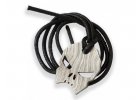Seppuku, also known as harakiri, is a ritual suicide performed by samurai and many other people in Japan. Seppuku was considered an honorable method of suicide that allowed individuals to maintain their dignity and honor. It was typically performed by having the person prepare a special ritual space where they would appear before their master or superior and bid farewell to him or her. The person then drew a short sword (tanto, or wakizashi) and used it to slash his or her abdomen, causing death. The body was then usually taken away and buried in a garden or other sacred place.
Seppuku was considered a very serious and respected act, used primarily as a way of defending oneself from loss of face and dignity, in case an individual failed in some important task or failed in an honorable commitment. In some cases, seppuku was ordered as a punishment for a breach of discipline or some other transgression. Although seppuku was banned in Japan in 1873, its tradition still persists as part of Japanese history and culture.

_-_edited.png)































